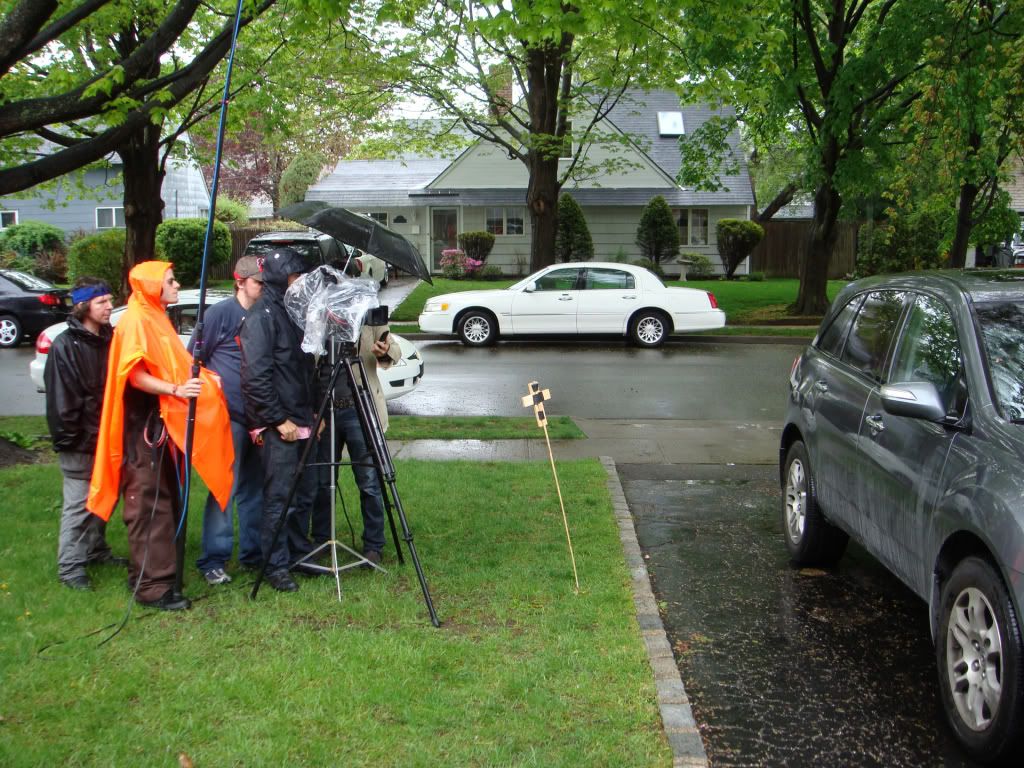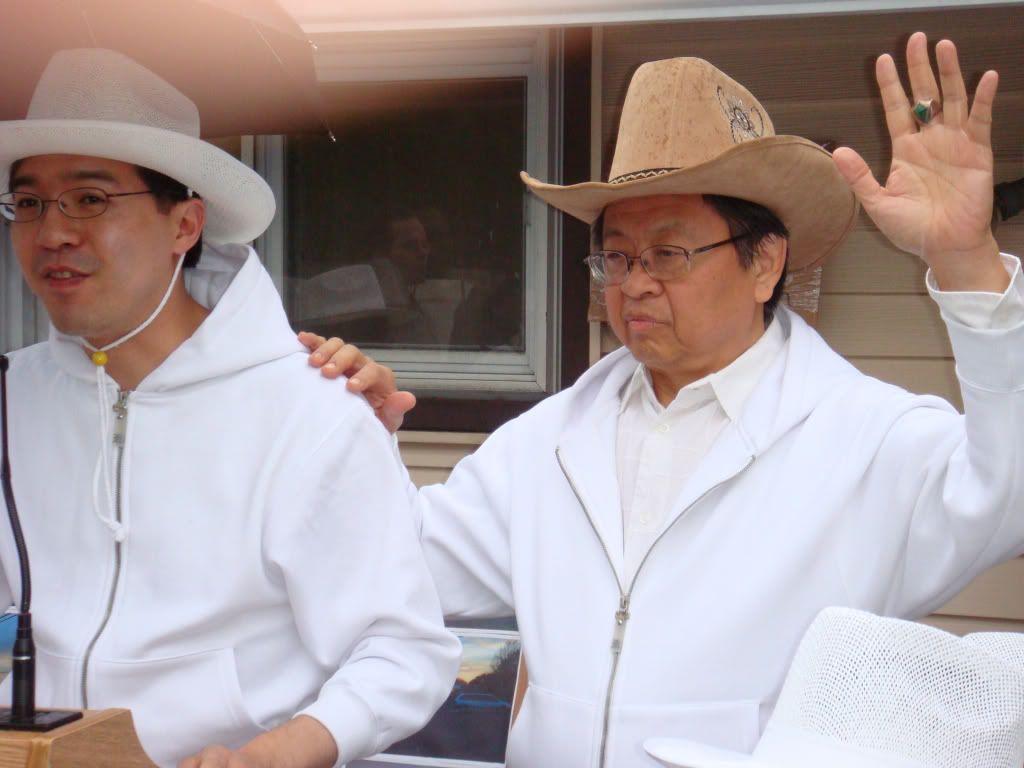
In this segment, what really comes through is the romance in the making of an independent feature film that must be experienced to be believed. Reading Jeremiah Kipp’s production diary, it’s obvious he finds satisfaction in the often times surreal nuance of no-budget film making. What’s neat about the second entry of Kipp’s diary is the way he the details the joys and challenges of shooting a 10 page press conference in the pouring rain, with keen observations into the performances, crew, and the enigmatic director. – Paul Meekin, Keyframe
—–
Day 2
Our director Preston Miller had a clever idea—we have scenes involving the Asian cult giving a press conference for journalists, and Preston thought it would be meta to cast several film critics (many of whom were supportive of his first feature,Jones) including House Next Door editor Keith Uhlich and contributors Dan Callahan, Kevin B. Lee and Vadim Rizov. In my email blast to my colleagues, I mentioned there would be free beer and BBQ, that Preston created a lively and fun atmosphere of good will, and that it would be a pretty easy day. Little did I know almost everything I said in these statements would be a lie, but at least the most important ingredient remained in place, namely, the free beer…
Of course, when we arrived on set it was a logistical nightmare. Even the trip to Long Island where we were shooting our scenes felt a little traumatic, trying to drive a 15-passenger van across Manhattan in the midst of a bicycle race that slashed its way right through midtown. It was showering rain, and we were locked into a schedule of shooting crucial exteriors. The press conference had to be completed early in our schedule because it plays on television during at least a dozen key scenes, none of which we can film without it. And there was no oasis of calm on location, especially in coordinating the wardrobe for our Asian cult. It seemed to take us hours to find the requisite white hoodies, white sweatpants and white cowboy hats that would fit our cast, not to mention trying on the 20 pairs of cowboy boots Preston just bought for the occasion. Our film critic friends nestled themselves in the kitchen, and I’m pretty sure they started drinking bottles of beer immediately to take the edge off.
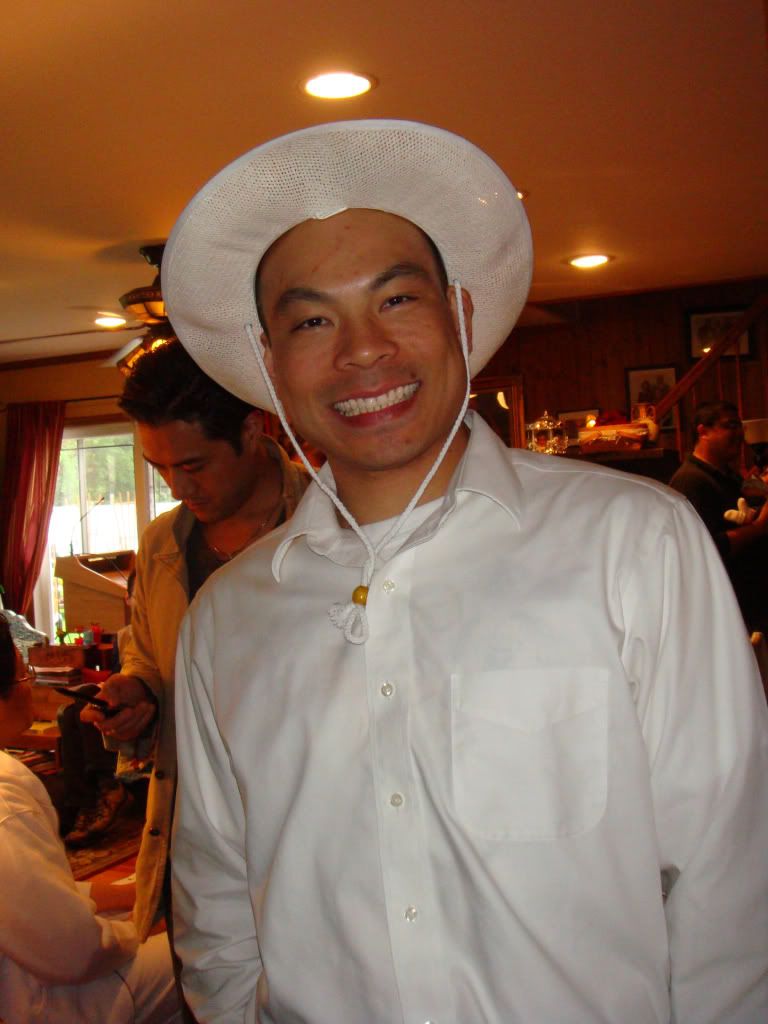
When I was fighting my way through the morass of duties, trying to unburden Preston of his responsibilities by delegating to our Assistant Director department, lead actress Jodi Lin told me I resembled Dennis Hopper’s mad journalist in Apocalypse Now. The only solution was to get the cast out of the house, into the rain, and start shooting something, anything, just to get some forward momentum in our day. Preston, being from the south, has always operated more or less on Preston Time, and the thought of rushing anything seems anathema to him. The images in his films reflect that—extremely wide shots that take place in drawn-out, real time that feel like the point-of-view of the story is wider than the characters, as big and expansive and abundant as the world. Just getting the actors outside, into the uncomfortable rain, helps us find that first bit of momentum—and my slight pushiness and repetitive militaristic comments (“Can we shoot?” I repeat over and over again like some wind-up toy) finally helps to get our first shot off.
And it’s a Preston Miller signature shot, where a car pulls into a driveway, a family emerges and is greeted by several members of the Asian cult. A young child (played by Matthew Chiu) wanders across the lawn gazing curiously at a man standing apart from the group doing a series of disciplined arm and leg exercises and moving ever closer to a pink cherry blossom tree and an inviting gate beyond. The image conveys meaning about family, the uniformity of an organization, the beckoning of a smiling cult and the boundless interest of children in the world around them. For a long time, I thought Preston identified himself with the father character (played by Shing Ka) who is as obsessive in his faith with this cult as Preston is about making movies, but now I wonder if he’s also the little boy taking in the great big world, too. Even as the shoot is going to hell around him, Preston doesn’t lose his boyishness. He has a kind of winsome smile and frequently jogs around the set, running from one side of the lawn to the other, and it doesn’t feel like the obnoxiousness of a fidgety adult but the buoyancy of a wide-eyed kid.
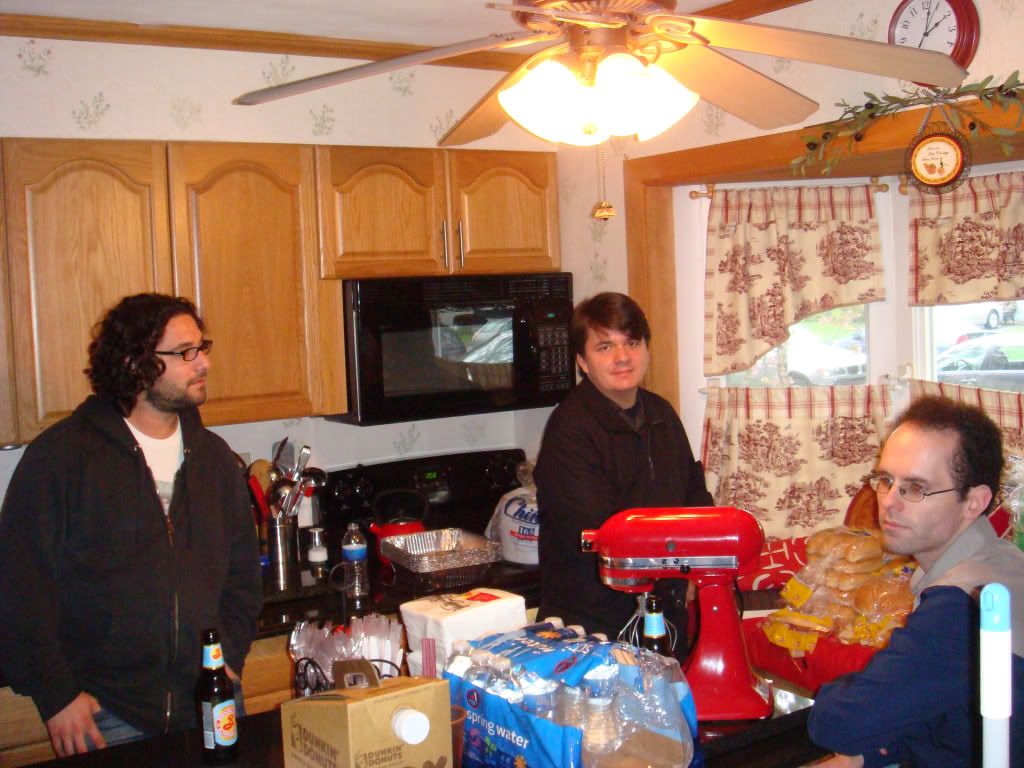
Vadim Rizov took on a character who was slightly provocative and ironic, with a penchant for slightly arch line readings. I likened him to a less obnoxiously verbose Harlan Ellison. Keith Uhlich, who had just interviewed Tilda Swinton for Time Out New York, was giving a kind of Tilda performance—so try to imagine Tilda playing David Frost in Frost/Nixon (not a bad idea, really) and you’re well on the way of seeing Keith’s take on this reporter character. Dan Callahan had the slight pushiness and edge of a fast-talking 1950s character in a good Howard Hawks movie. You get the picture.
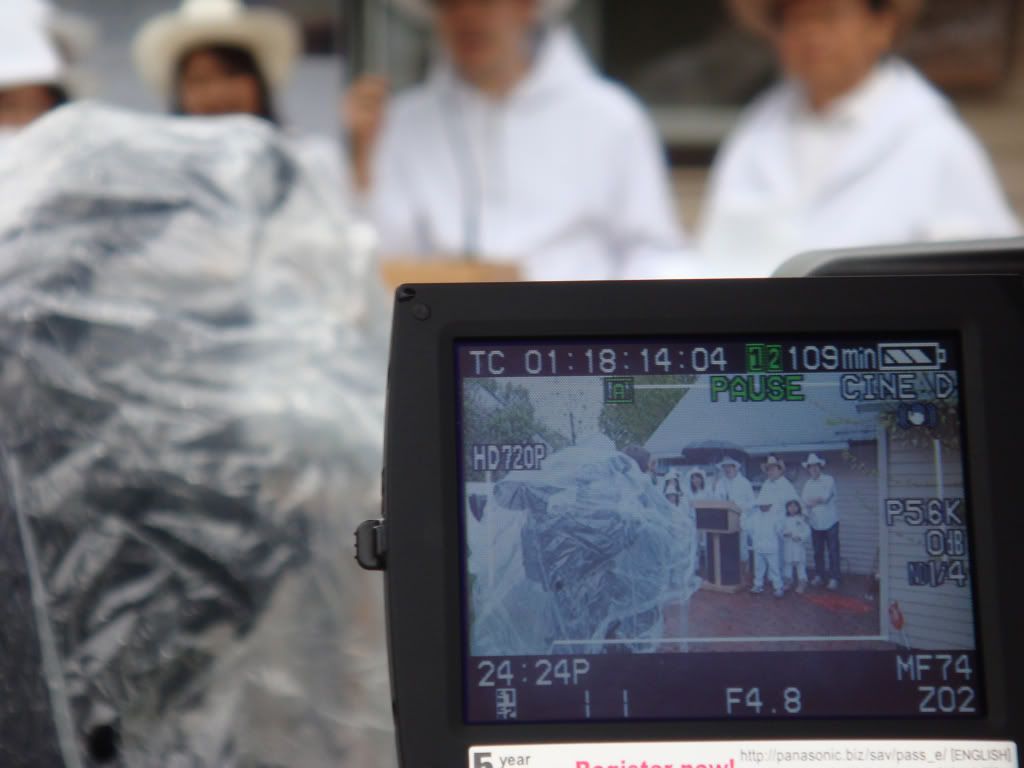
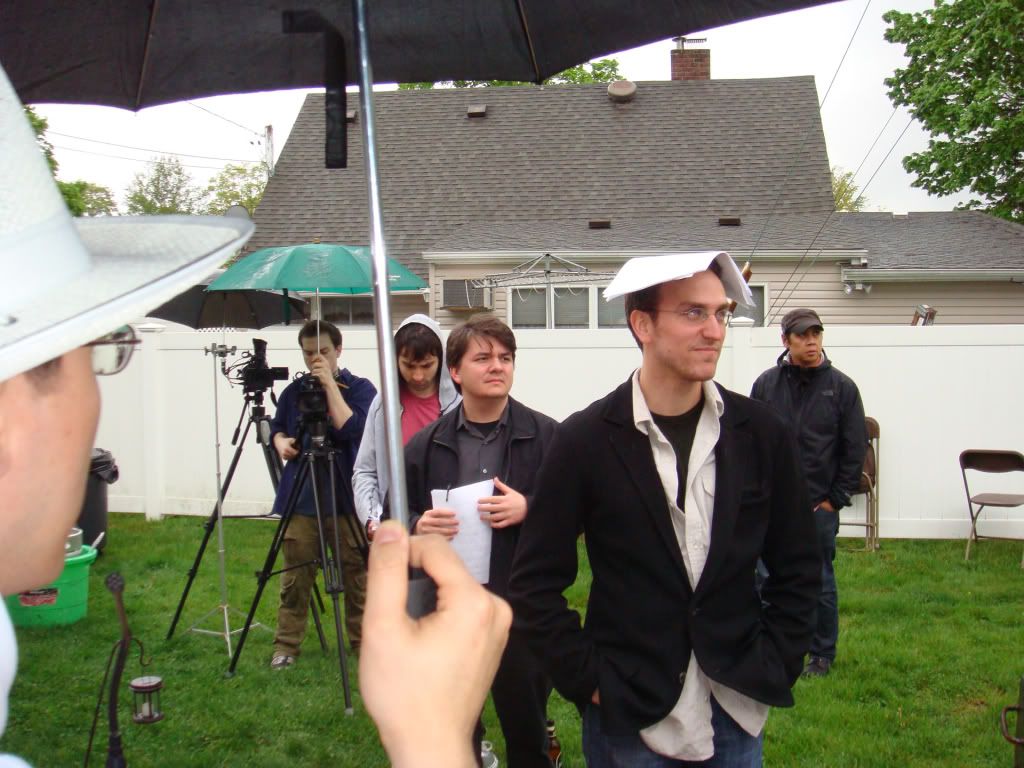
Rushing headlong through this heavy page count under arduous conditions, we finish with a scene involving yet another Richard Liu monologue, and I notice Jackson Ning as Teacher Chen navigating his way around the set during the shot. His character has no dialogue today, and yet has to have an incredibly powerful presence onscreen. He reaches out his hands grazing his fingertips along the sets Preston had constructed during the week, as if making a small blessing or honoring the space. Jackson—who has probably been more frustrated during the day than anyone, since he may be the oldest actor on set and probably got a little annoyed with the run-and-gun aspects of this kind of filmmaking—utterly transforms during these scenes.
When he approaches Wayne Chang as Liu and places a paternal hand on his shoulder, you can almost feel electricity coming off of Jackson’s fingers. And he was completely in the moment, completely living the character, and totally divorced from the on-set chaos that surrounded him during the day. At one point, I race up to him with the camera and say, “Look at your ring!” The ring, of course, that can turn into a spaceship…and Jackson does exactly that, looking down at the ring as a plane flies overhead, and then when he turns his head, birds in the distance start singing, as if drawn out of their nest by Teacher Chen even during this paralyzing rain. Jackson, a generous actor, moves to Wayne as Liu and shares this moment of time with him, sharing the sound of the birds, and Wayne’s face seems to emanate light. It’s a poetic moment for us to end on, and shortly thereafter we finish our paperwork and the tired film critics make their way to the 15-passenger van on their way home. The professional actors and film critic non-actors alike seem tired, but pleased.
Preston seems neither happy nor sad; he’s in the middle of this project now, one which will remain the source of financial frustration, personal sacrifice, and hungering need. Today was always known to be the “hardest day” on our schedule, but Preston doesn’t beam with joy as we finish. He knows there are many, many more days of climbing the mountain that is this project, one that is more massive than his budget, and yet the thought that he won’t continue to move forward inch by painful inch never enters his mind. I guess this is the madness filmmakers need, and is the madness of shooting out in the rain, the madness of what makes him happier than almost anything in the world. The film critics touched it for a moment, Jackson and Wayne discovered the magic, but Preston has to bear it. For the next several weeks, I am out of town producing another feature in Sarasota, FL. Preston will be carrying it on his own.
______________________________________________

